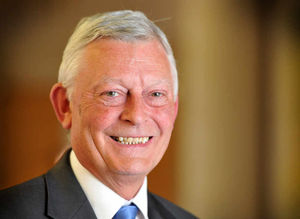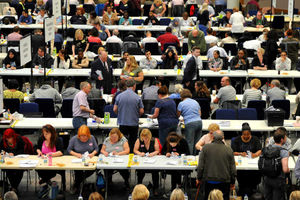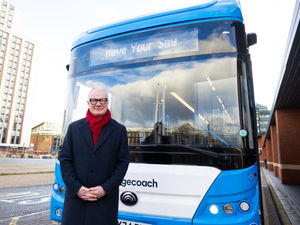Re-elected West Midlands PCC David Jamieson prioritises recruitment
It was a case of 'as you were' after the police and crime commissioner elections across the region as both incumbents held onto their positions.

In the West Midlands, Labour's David Jamieson was returned to office after securing 49.9 percent of the first round vote.
The former government minister finished well ahead of his main rival, Conservative Les Jones, who secured 25.8 percent of people's first preferences.
UKIP's Pete Durnell came third with 17 percent while independent candidate Andy Flynn finished bottom of the pile with 7.3 percent of votes cast.

The result was marred by a huge number of rejected ballot papers, totalling 28,346 across the region. But turnout was much improved on past PCC elections with 30.03 percent of eligible voters having their say.
A jubilant Mr Jamieson said his priority moving forward was boosting the number of new officers joining West Midlands Police.
He has pledged to recruit 1,000 new officers by 2020. He added: "One big area which I will push on with now is economic development.
"It is the biggest challenge we have got in the West Midlands and the police have their part to play.
"In areas where there are low levels of crime, that is where companies want to come in."

Counting of the votes at the ICC in Birmingham took place in two stages after no one candidate secured more than 50 per cent of first preferences.
But Mr Jamieson had looked set for victory after securing the most votes in six of the seven metropolitan boroughs which form the region including Wolverhampton, Dudley, Sandwell and Walsall.
Mr Jones' share of 25.8 percent of the first round votes was slightly down on his performance in 2014 when he was backed by 26.8 percent.
He was, however, re-elected as councillor for Pedmore and Stourbridge East following Thursday's vote.

In Staffordshire, Conservative Matthew Ellis declared he would 'finish the job' after he was re-elected after the count at Stoke Civic Centre as the county's Police and Crime Commissioner in a close contest with Labour's George Adamson.
Mr Ellis polled 75,000 after the second round of voting for the £75,000-a-year job, compared to the Cannock Council leader's 66,515.
He said: "It is very important our focus turns to putting all the resources into front line policing we can."
Mr Adamson, who was a police officer in the Black Country for 17 years, said not enough voters knew there was an election going on.
Turnout was up to 21.57 per cent up from 11 per cent four years ago – then the lowest in the country.
Four years ago there was just two candidates but this year there was five with UKIP's Harold Gregory, the Green Party's Paul Woodhead, and independent Natalie Devaney who retired as a constable from Staffordshire Police after 30 years just eight months ago.

No candidate was able to win the 50 per cent plus one vote needed to win outright meaning the counting went to a second round.
Mr Ellis and Mr Adamson advanced to the final round with Mr Gregory, Mr Woodhead and Ms Devaney being eliminated and the second preference votes on their ballot papers redistributed.
In the first round Mr Ellis polled 54,753 votes, Mr Adamson got 54,753, Mr Gregory 27,550, Ms Devaney 22,155, and Mr Woodhead 6,527. But the gap of 8,370 was too much for Labour to make up.
Mr Ellis won the polls in Lichfield, South Staffordshire, Stafford, East Staffordshire, Tamworth, and Staffordshire Moorlands.
Whereas Mr Adamson triumphed in Newcastle-under-Lyme, Stoke, and his home turf in Cannock.
The poor turnout in Stoke, just 15 per cent, was a major factor in Mr Adamson's defeat – he needed to win big here to have any chance of ousting Mr Ellis whose backing in the Tory shires and the key town of Stafford carried him through.





